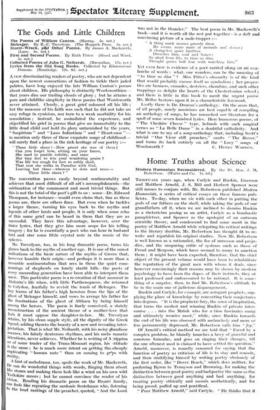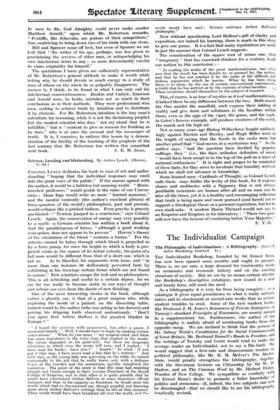Home Truths about Science Modern Humanists Reconsidered. By the Rt.
Hon. J. M. Robertson. (Watts and Co. 7s. 6d.) THIRTY-six years ago, when Carlyle and Ruskin, Emerson and Matthew Arnold, J. S. Mill and Herbert Spencer were still names to conjure with, Mr. Robertson published Modern Humanists, a series of critical essays on these famous pub- licists. To-day, when we vie with each other in putting the gods of our fathers on the shelf, while taking the gods of our
grandfathers off it, when we are inclined to dismiss Ruskin as a rhetorician posing as an artist, Carlyle as a bombastic pamphleteer, and Spencer as the apologist of an outworn scientific theory, and condescend to find some merit in the poetry of Matthew Arnold while relegating his critical writings to the literary dustbin, Mr. Robertson has thought fit to re-, write and republish his original studies. Now Mr. Robertson is well known as a rationalist, the foe of unreason and preju dice, and the unsparing critic of systems such as those of Freud and Bergson, which have seemed to many to sanction them ; it might have been expected, therefore, that the chief Object of the present volume would have been to rehabilitate the reputation of the great men with whom it deals, since however convincingly their reasons may be shown by modern . psychology to have been the dupes of their instincts, they at least professed and endeavoured to be rational. It is some- thing of a surprise, then, to find Mr. Robertson's attitude to be in the main one of judicious disparagement.
Ruskin and Carlyle, for example, are arrogant prophets, sup- plying the place of knowledge by converting their conjectures into dogmas. It is the prophetic fury, the sense of inspiration, that turns the modest and winning Ruskin of private inter- course . . . into the Mandi who for a time fascinates many and ultimately wearies most," while, since Ruskin towards the end of his life was obsessed with melancholy and more or less permanently depressed, Mr. Robertson calls him "fey:'
Of Arnold's critical method we are told that " Faced by a complex problem, he blandly launches a bevy of graceful and sonorous formulas, and goes on ringing their changes, till the one oftenest used is claimed to have settled the question." Arnold, moreover, is roundly censured for saying that the function of poetry as criticism of life is to stay and console, and then stultifying himself by writing poetry obviously of the first order, like " Dover Beach," which does neither, for preferring Byron to Tennyson and Browning, for making the distinction between good poetry and bad poetry the same as the distinction between good anything and bad anything, for treating poetry ethically and morals aesthetically, and for being proud, puffed up and pontifical. " Poor Matthew Arnold," said Carlyle. " He thinks that _ _ he were to die, God Almighty could never make another Matthew Arnold," upon which Mr. Robertson remarks, Pontiffs, like Jehovahs, are jealous of their>coinpetitors," thus contriving to bring down two of his birds with one stone.
Mill and Spencer come off best, but even of Spencer we are told that " No writer of his age, perhaps, was less given to proclaiming the services of other men, or acknowledging his own intellectual debts to any ; or more determinedly careful to claim originality for himself."
The quotations I have given are sufficiently representative of Mr. Robertson's general attitude to make it worth while asking why he should devote so much energy to a study of men of whom on the whole he so palpably disapproves. The answer is, I think, to be found in what I can only call his intellectual conscientiousness. Ruskin and Carlyle, Emerson and Arnold were, he holds, mistaken not so much in their conclusions as in their methods. They were professional wise men, seeking to achieve truth by intuition and to distribute it by rhetoric. For Mr. Robertson intuition is the lazy man's substitute for reasoning, while it is not the declaiming prophet but the modest scientist who does not cry aloud that he is infallible," but is " content to give us reasons for thinking as he does," who is at once the servant and the messenger of truth. It is, I conceive, to enforce this lesson by a demon- stration of the futility of the teaching of the prophets of the last century that Mr. Robertson has written this somewhat



























































 Previous page
Previous page